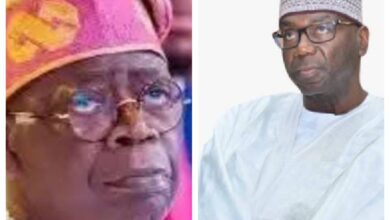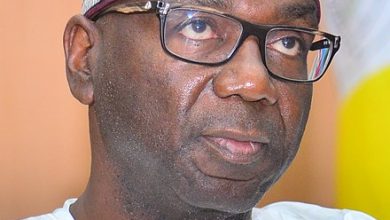Mobilizing domestic financing for Development

By Abdulwahab Oba
Last week, Dr Abdulfatah Ahmed presented to the Nigeria Governors’ Forum, his administration’s model on mobilizing internal funds for present and future development of our state as a template for other states. This week, I present the Governor’s exposition on this page. Mobilizing Domestic Financing for Development, the theme of this year’s Peer Learning Event, is apt because it comes at a time States are under increasing internal pressure to identify alternative sources of revenue to meet recurrent obligations such as salaries as well as fund critical development projects.
As the nation prepares for a new minimum wage law which is expected to put even greater strain on states’ finances, it is incumbent on us all, as stakeholders in the governance of our states, to strike the necessary balance between the economic and social costs of generating increased internal revenue through taxes, fees, levies, and fines.
As we are all aware, there exists an intrinsic link between taxation, public welfare, and good governance. A government’s capacity to enhance general well-being and provide other indices of good governance is directly related to its ability to muster adequate resources to meet its obligations.
No state or nation can hope to prosper without a robust taxation system to provide enough revenue to fund recurrent expenditure, people-oriented programs, and critical public infrastructure.
While several states including Kwara have recorded significant improvements in their internal revenue, a review of national and states performances reveals there is considerable room for improvement. For instance, Nigeria’s Tax to Gross Domestic Product (GDP) ratio, which measures the difference between GDP and Tax Revenue, stands at six percent and ranks among the lowest on the continent. Among states, a report by The Economic Confidential suggests that seven states were considered insolvent based on IGR receipts.
In its 2017 Annual States Viability Index (ASVI), Economic Confidential rated states on the basis of IGR to Federation.
Account Allocations (FAAC) ratio. It found that more than half of the states in the country are insolvent because their internal revenue is below ten percent of federated revenue. It concluded that without federally allocated revenue, many states cannot meet their necessary obligations. Taken together these two facts, alongside fluctuations in federated revenue on account of dwindling oil revenue, underline the need for states to mobilize alternative revenue for development.
As we dwell on Mobilizing Domestic Financing for Development, therefore, please permit me to share with you how we grew internal revenue in Kwara State by over 170% within two years. In 2014, we were confronted by difficult economic challenges on account of significant drops in Federated Revenue and developments in the global economy which impacted our revenues negatively. The need to shore up internally generated revenue, therefore, became apparent. At that time, the defunct Kwara State Board of Internal Revenue (BIR) was averaging about N600 million monthly. Six-hundred million naira was incapable of augmenting allocations to pay salaries or fund our infrastructure needs.
In the same year, a study of the infrastructure needs of Kwara State identified a N255 billion gap. This discovery led to the Kwara State Infrastructure Investment and Financing Strategy, a comprehensive and targeted plan to systematically address the infrastructure deficit.
While it was evident that a phased approach was necessary to fill this gap, an urgent financing strategy was also required. Neither the fluctuating federal allocation nor our then meager IGR could suffice. Consequently, urgent reforms in our revenue generation were needed if the government was to sustain the payment of monthly salaries and implement the Kwara State Infrastructure Investment and Financing Strategy. However, the then imminent general elections made the passage of the necessary laws to give legal backing to the needed difficult.
On June 22, 2015, having been returned to office for a second term, I signed the Kwara State Revenue Administration Law, effectively abrogating BIR and replacing it with the Kwara State Internal Revenue Service (KWIRS). With the KWIRS, we remodeled the revenue mobilization and management process by changing the people, processes, and technologies of revenue collection and management. Based on these changes, KWIRS achieved growth in the monthly IGR from N600 million monthly as of 2015 to a monthly average of N1.45 billion in 2016, a monthly average of N1.75 billion at the end of 2016, and a monthly average of N2.2 billion at the end of the first quarter of 2018.
On account of these growths in our internal revenue, we have consistently been able to augment monthly federal allocation to ensure prompt payment of salaries as well as fund major
ongoing projects, introduce new ones and pay off existing debts owed to contractors in the state. Our model for ensuring the sustained funding of these significant projects was the Kwara State Infrastructure Development Fund (IF-K). IF-K is based on an initial seed fund of N5 billion and a monthly contribution of N500 million from IGR through an Irrevocable Standing Payment Order (ISPO).
IFK funds are disbursed on a quarterly basis and are managed by a reputable investment company, Investment One, which has been appointed by law as trustee for the scheme. The Company also markets the fund to potential investors and mitigates against payment risks by pooling the funds and limiting their utilization to projects for which they have been approved. IFK is also insulated from political control as Investment One is independent of the state government, and only disburses funds on the provision of certified completion documents and at agreed milestones. As a further measure to ensure quality standards are maintained in IF-K funded infrastructure, registered independent project inspectors also verify projects.
Since it commenced in December 2016, IGR-fed IFK projects have been funded to the tune of N13 billion including payments for completed and ongoing projects across the state. The projects include Satellite Campuses of Kwara State University (KWASU) at Osi, Ilesha-Buraba and its School of Business and Governance in Ilorin. Others are the Light Up Kwara Project under which we are deploying 78 kilometers of solar street light infrastructure under a Public Private Partnership (PPP) arrangement with operation and maintenance agreement over the PPP life cycle. IF-K is also funding major projects across the state such as the Geri Alimi Diamond Underpass and the Dualisation of Zango-UITH Road as well as the final phase of the Secondary phase Ilorin Water Reticulation which is providing an additional 48, 000 homes across the metropolis access to clean water.
This summary demonstrates we have mobilized IGR for financing not only development but also our primary obligations to citizens and residents. We offer these reforms as templates that other states can adopt and adapt for local implication. We hope that more states will become financially sustainable and be better positioned to fund development on account of the insights that I have shared with you in these welcome remarks and others that this meeting will provide you with.
*Oba can be reached via e-mail:abdulwahaboba@gmail.com





